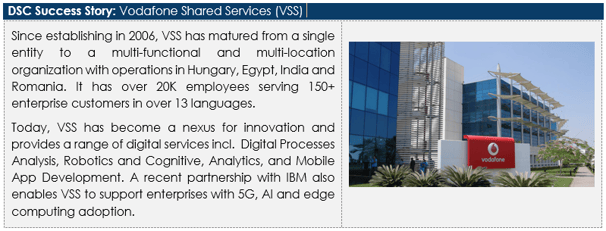Global enterprises encounter several roadblocks in their digital transformation journey which is tied to a dependency on traditional operating models. Business leaders are therefore searching for new ways to address their challenges. Digital Services Centers (DSCs) have now emerged as a solution to provide organizations with a new model that supports development and delivery of digital enterprise services. DSC is an evolution of the traditional IT shared services model to provide digital services and support and enablement of enterprise innovation.
The Role of DSCs in Driving the New Operating Model
The expansion of the Digital Economy is causing major disruption across the global business environment. There is now great demand for digital-led products and services amongst global enterprises and consumers, fueled by advancements in digital technologies and solutions such as quantum computing to enable super-powered digital environments, and blockchain for greater enterprise connectivity and transparency.
“Going digital is no longer an option, it is the default.”
- Natarajan Chandrasekaran, Chief Executive Officer and Managing Director at TCS
Facing a widening digital competency gap, companies are therefore being forced to quickly transform their business model and operational landscape to adapt to changing markets. However, most companies are suffering from failing digital business transformation (DBT) programs – largely due to their dependency on traditional operating models that is restraining real progress. Such cases are riddled by a lack of synergy and alignment throughout the business, resulting in very low transformational impact and returns.
To build enhanced business value and provide a compelling end-to-end customer experience, organizations need to commit to a next-generation operating model that combines digital technologies and operations capabilities to improve revenue, customer experience, and cost while driving enterprise-wide transformation.
Traditional vs. New Operating Models to Drive Digital Business Transformation

Digital Services Centers (DSCs) are now moving into the limelight as a requisite model to accelerate and sustain digital business transformation. In fact, over 90% of enterprise leaders from a recent study agree that a DSC-type model is needed to develop digital competencies and drive desired business outcomes[1].
“You never change something by fighting the existing reality. To change something, build a new model that makes the existing model obsolete.”
- Buckminster Fuller
Essentially, a DSC is an evolution of the traditional IT shared services model to provide digital services and transformation support and enablement of enterprise innovation. This should include key offerings such as cloudification, platform modernization, data strategy, analytics & AI, automation at scale, digital workforce development, digital customer enablement, digital innovation, agile IT operations (incl. DevOps and microservices), as well as cybersecurity and compliance services.
Key DSC Service Offerings

With the establishment of a DSC, an enterprise can centrally develop and manage their digital capabilities while helping to address some major transformation obstacles, such as managing the overall complexity of the change, legal and security concerns, dependency on legacy infrastructure, limited digital knowledge and skills and lack of funding. However, there are some key guidelines that enterprises should follow to successfully establish their DSC.

Open the full whitepaper for more on establishing a digital service center, cost considerations and more.
[1] Source: Riverbed Technology (2019). https://www.riverbed.com/blogs/digital-performance-eiu-study-benchmarking-competencies.html
Related: Building a Foundation to Enable Digital Transformation
Related: Choosing the Right Digital partner: Paradigm Evolution in Assessment Approaches
Related: Enabling Transformation in the Digital Economy
Related: Leveraging IT-BPO Convergence for Enterprise Digital Transformation
